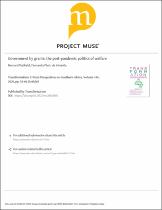| dc.contributor.author | Dubbeld, Bernard | |
| dc.contributor.author | Pinto de Almeida, Fernanda | |
| dc.date.accessioned | 2023-06-29T08:59:18Z | |
| dc.date.available | 2023-06-29T08:59:18Z | |
| dc.date.issued | 2020 | |
| dc.identifier.citation | Dubbeld, B., & Pinto de Almeida, F. (2020). Government by grants: The post-pandemic politics of welfare. Transformation Critical Perspectives on Southern Africa, 104, 55-66. 10.1353/trn.2020.0032. | en_US |
| dc.identifier.issn | 1726-1368 | |
| dc.identifier.uri | 10.1353/trn.2020.0032. | |
| dc.identifier.uri | http://hdl.handle.net/10566/9174 | |
| dc.description.abstract | In April 2020, with South Africa in national lockdown, president Cyril
Ramaphosa announced the Covid-19 relief program on a scale he called
‘historic’. He affirmed that the state would not only reestablish the economy
but forge a new economy and ultimately a new society in what he called a ‘new
global reality’. Already at the end of March, his government had announced a
special Covid-19 Social Relief of Distress Grant of R350 a month to be paid to
currently unemployed individuals who did not receive any other form of social
grant or unemployment benefit. Existing Child Support Grant beneficiaries
also received an additional sum. With Statistics South Africa announcing in
September the unprecedented loss of 2.2 million jobs in the second quarter of
the year, in October the government extended the special unemployment grant
for another three months. | en_US |
| dc.language.iso | en | en_US |
| dc.publisher | Johns Hopkins University Press | en_US |
| dc.subject | Politics | en_US |
| dc.subject | Covid-19 | en_US |
| dc.subject | Public health | en_US |
| dc.subject | Social development | en_US |
| dc.subject | South Africa | en_US |
| dc.title | Government by grants: The post-pandemic politics of welfare | en_US |
| dc.type | Article | en_US |

